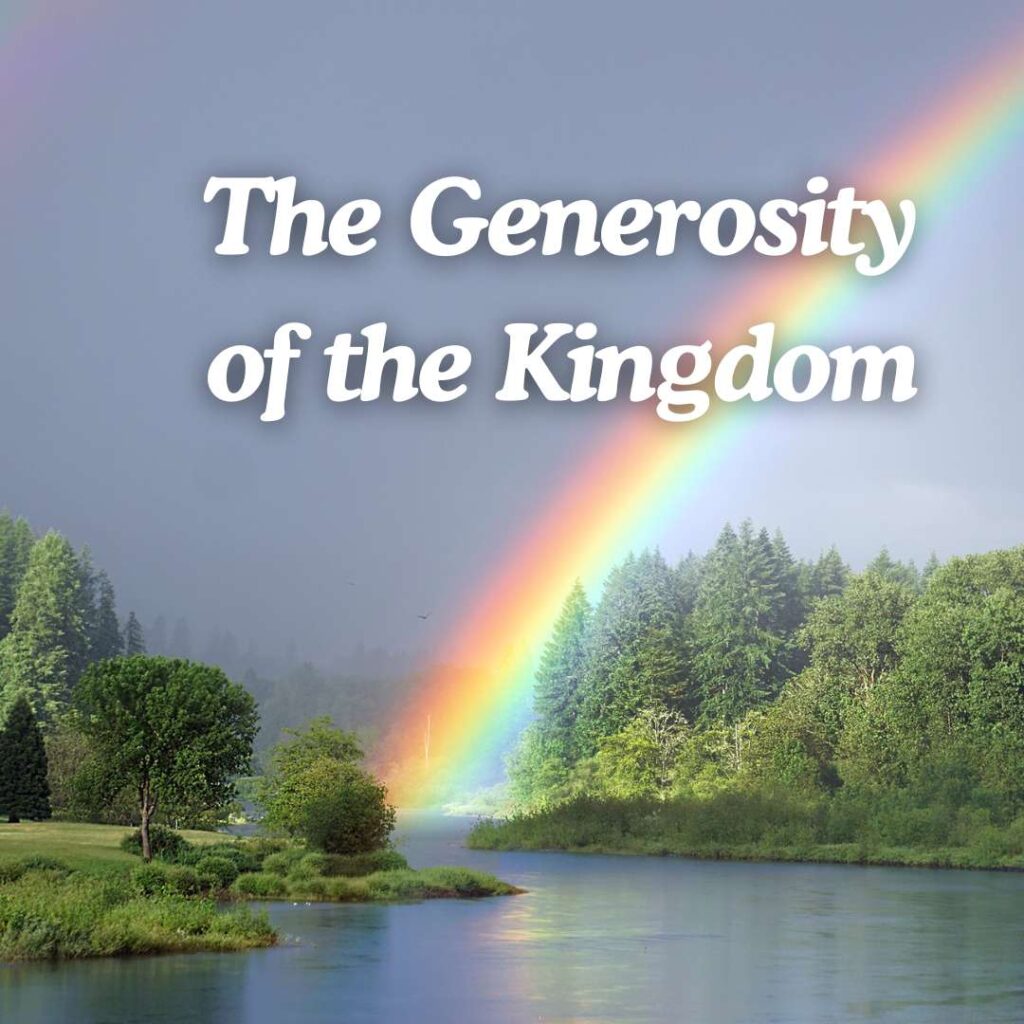 Scripture: Matthew 20:1-16 (WEBBE)
Scripture: Matthew 20:1-16 (WEBBE)
1 “For the Kingdom of Heaven is like a landowner who went out early in the morning to hire laborers for his vineyard.
2 When he had agreed with the laborers for a denarius a day, he sent them into his vineyard.
3 He went out about the third hour, and saw others standing idle in the marketplace.
4 To them he said, ‘You also go into the vineyard, and whatever is right I will give you.’
5 So they went. Again he went out about the sixth and the ninth hour, and did likewise.
6 About the eleventh hour he went out, and found others standing idle. He said to them, ‘Why do you stand here all day idle?’
7 They said to him, ‘Because no one has hired us.’ He said to them, ‘You also go into the vineyard, and you will receive whatever is right.’
8 When evening had come, the lord of the vineyard said to his steward, ‘Call the laborers and pay them their wages, beginning from the last to the first.’
9 “When those who were hired at the eleventh hour came, they each received a denarius.
10 When the first came, they supposed that they would receive more; they likewise each received a denarius.
11 When they received it, they murmured against the landowner,
12 saying, ‘These last have spent one hour, and you have made them equal to us who have borne the burden of the day and the scorching heat.’
13 “But he answered one of them, ‘Friend, I am doing you no wrong. Didn’t you agree with me for a denarius?
14 Take what is yours and go your way. It is my desire to give to this last man even as to you.
15 Isn’t it lawful for me to do what I want with what I own? Or is your eye evil because I am good?’
16 “So the last will be first, and the first last; for many are called, but few are chosen.”
Reflection:
In this parable, Jesus illustrates profound truths about the nature of the Kingdom of Heaven through the story of a landowner and his vineyard workers. The narrative explores themes of generosity, fairness, and divine grace, challenging our understanding of merit and reward.
1. The Generosity of the Landowner:
The parable begins with the landowner hiring workers for his vineyard at different times throughout the day. Those hired at the eleventh hour received the same pay as those who worked all day (Matthew 20:1-9). This unexpected generosity reveals the landowner’s heart and the nature of the Kingdom of Heaven.
The landowner’s actions reflect God’s boundless grace. Just as the landowner chooses to be generous with his resources, God offers His grace and salvation freely, irrespective of when we come to Him. This generosity challenges our notions of fairness and reward, emphasizing that God’s grace is not bound by human standards.
2. The Perception of Fairness:
When the workers who labored all day see that those hired later receive the same wage, they grumble and feel that they have been treated unfairly (Matthew 20:10-12). They compare their situation with those who worked less, highlighting a common human tendency to measure our worth against others.
The parable teaches us that God’s fairness is not about equal outcomes but about His sovereign right to dispense His grace as He chooses. The landowner’s response, “Isn’t it lawful for me to do what I want with what I own?” (Matthew 20:15), reminds us that God’s ways are higher than ours, and His generosity cannot be confined by our human expectations of fairness.
3. The Challenge to Our Attitudes:
The parable concludes with the statement, “So the last will be first, and the first last” (Matthew 20:16). This reversal of expectations underscores a central theme in Jesus’ teachings: the Kingdom of Heaven operates on principles that often contradict worldly values.
In God’s Kingdom, humility and service are valued over status and reward. This parable challenges us to examine our attitudes towards grace and reward. Are we content with God’s generosity, or do we find ourselves begrudging others’ blessings? It calls us to embrace a spirit of humility and gratitude, recognizing that we are all recipients of God’s unearned favor.
4. The Call to Embrace Grace:
The parable illustrates that many are called to the Kingdom, but few are chosen (Matthew 20:16). The calling to follow Jesus is extended to all, regardless of when we come to faith or how much we have done. The choice to respond to that call and live in alignment with God’s values is what sets the chosen apart.
We are invited to live out the values of the Kingdom by extending grace, showing generosity, and embracing the radical nature of God’s love. This involves not only accepting God’s grace for ourselves but also reflecting that grace in our interactions with others.
Prayer:
Lord Jesus, thank You for Your incredible generosity and grace that extends beyond our human understanding. Help us to embrace the principles of Your Kingdom, where generosity and grace surpass our notions of fairness. Teach us to be content with Your provision, to celebrate the blessings of others, and to live with a heart full of gratitude. May we reflect Your love and grace in all that we do and be agents of Your Kingdom in a world that needs Your transformative power. Amen.
Contemplation:
Take a moment to reflect on how you view God’s grace and generosity in your own life. Are there areas where you struggle with feelings of unfairness or comparison? Consider how you can better align your attitudes with the values of the Kingdom, embracing both the grace you receive and the grace you offer to others. Ask God to help you live out His values with humility and joy, recognizing that His ways are higher than our own.
